What's the Answer? - Create
What's the Answer? - Create
What's the Answer? - Create
Create successful ePaper yourself
Turn your PDF publications into a flip-book with our unique Google optimized e-Paper software.
• reviewing and reporting on TILA to ascertain whe<strong>the</strong>r improved outcomes have been achieved foryoung people leaving care; and• on-going development and implementation of nationally consistent approaches to non-financialsupport for young people leaving care (Commonwealth of Australia, 2009b:18).Developing a Work Plan for transitioning to independenceTo progress <strong>the</strong> development of nationally consistent working arrangements and approaches for <strong>the</strong>provision of support services for young people in care transitioning to independence, <strong>the</strong> NationalFramework Implementation Working Group (NFIWG) – Transitioning to Independence Sub-WorkingGroup (herein, referred to as <strong>the</strong> NFIWG Transitioning to Independence Sub-Working Group) isdeveloping a Work Plan that will be submitted to NFIWG for consideration.Consultation with key stakeholders was initiated through a discussion paper developed by <strong>the</strong>Department of Families, Housing, Community Services and Indigenous Affairs (FaHCSIA, 2010), whichdrew on national and international seminal research work on transitioning from care. The paperproposed an implementation framework based on a series of short-, medium- and long-term goalsfor a nationally consistent approach to transitioning to independence. The proposed framework wasbased on <strong>the</strong> premise that <strong>the</strong> success of transitioning from care to independence for young peopleleaving care is optimised when <strong>the</strong> types and levels of support provision take into account:• <strong>the</strong> individual needs of young people in-keeping with <strong>the</strong> cumulative effects of <strong>the</strong>ir pre-carefamily experiences and placement history;• <strong>the</strong> phased process of transitioning (beginning with a preparation phase, <strong>the</strong>n moving to <strong>the</strong>transition phase and culminating in an after care phase); and• a planned approach to transition identifying <strong>the</strong> required supports for each phase based onindividual needs <strong>the</strong> key areas of: safe and sustainable housing education employment financial security social relationships and support networks health – physical, emotional (including self-esteem and identity), mental and sexual life and after care skills. (FaHCSIA, 2010:4-6,8-12)CREATE Foundation was one of <strong>the</strong> key stakeholders consulted given that it:• is <strong>the</strong> peak national body representing <strong>the</strong> voices of all children and young people in out-of-homecare and advocates to improve <strong>the</strong> care system, through consultation with children and youngpeople, ensuring that <strong>the</strong>ir voices are heard by key decision makers in government and out-ofhomecare sector stakeholders; and• has produced two seminal research reports that specifically addressed transitioning from care(McDowall, 2008 & 2009).However, in accordance with <strong>the</strong> partnership arrangements set down in <strong>the</strong> Implementation Plan2009-2012 (Commonwealth of Australia, 2009b:30), consultation with “... young people <strong>the</strong>mselves,as opposed to just those who represent <strong>the</strong>m ...” needed to be sought as it is considered essential “...to getting <strong>the</strong> implementation and delivery of <strong>the</strong> National Framework right, because it is childrenand young people who will be most affected by it.”2




![pdf [107kB] - Department of Families, Housing, Community Services](https://img.yumpu.com/51272499/1/190x245/pdf-107kb-department-of-families-housing-community-services.jpg?quality=85)
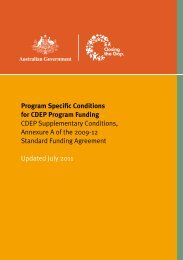
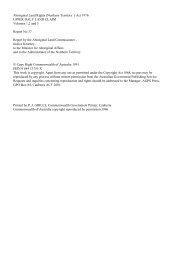
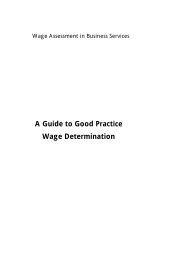

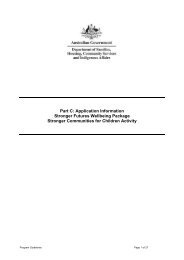
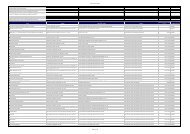
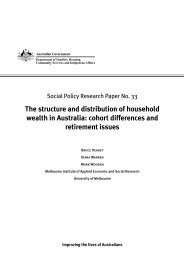
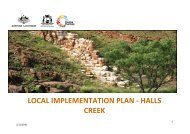
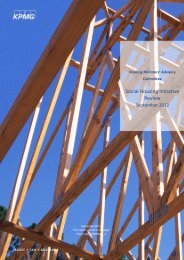
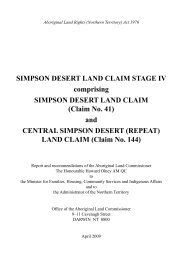
![Land Claim - pdf [278kB] - Department of Families, Housing ...](https://img.yumpu.com/47002639/1/184x260/land-claim-pdf-278kb-department-of-families-housing-.jpg?quality=85)
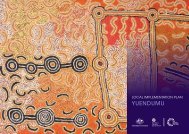
![Borroloola Land Claim - pdf [299kB] - Department of Families ...](https://img.yumpu.com/46103973/1/184x260/borroloola-land-claim-pdf-299kb-department-of-families-.jpg?quality=85)